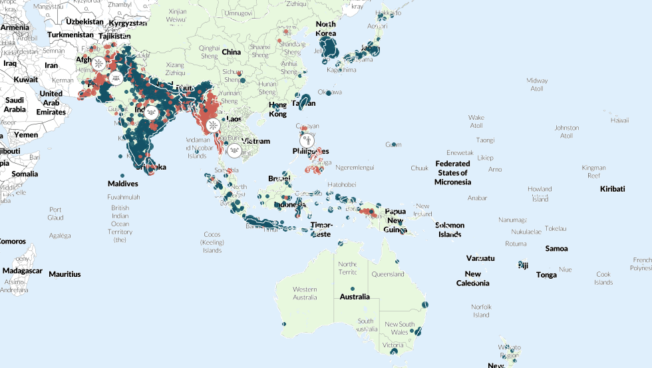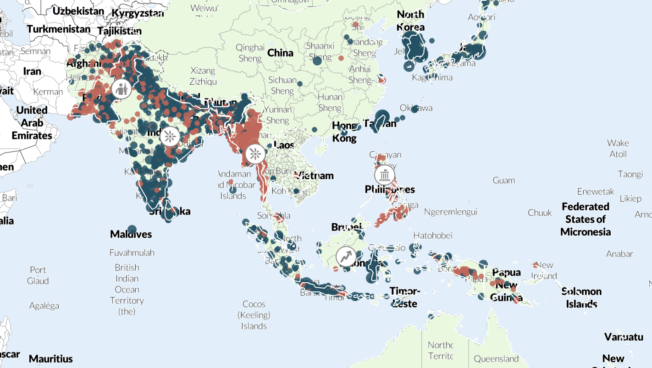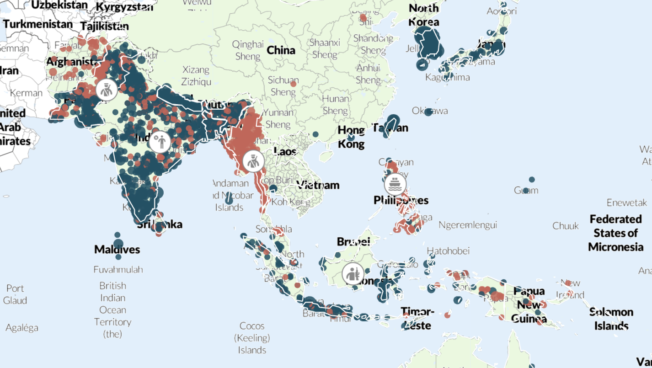Regional Overview
Asia-Pacific
May 2024
Posted: 10 June 2024
In this Regional Overview
- Bangladesh: Low voter turnout and partisan violence mar local body elections
- India: General elections continue amid partisan violence and claims of voter suppression
- Myanmar: Civilians subject to military airstrikes and retaliation
- New Caledonia: Proposed electoral reforms trigger deadly rioting
- Papua New Guinea: Deadly communal violence breaks out in Bogia, Madang province
- Thailand: Violence in the Deep South continued with tactical and symbolic actions
- Taiwan: Nationwide protests erupt in opposition to KMT-backed legislative reform bill
Bangladesh: Low voter turnout and partisan violence mar local body elections
Bangladesh recorded an increase in political violence in May compared to the month prior, coinciding with the first three phases of polling for the upazila parishad (sub-district council) elections; the final phase is scheduled for 5 June.1The Financial Express, ‘139 Upazilas go to polls today in 1st phase,’ 8 May 2024 The principal opposition party, the Bangladesh Nationalist Party (BNP), boycotted the elections alongside other parties, calling them “farcical” and questioning the Election Commission’s independence.2Mubashar Hasan, ‘BNP Boycotts Elections in Bangladesh Again,’ The Diplomat, 29 April 2024 The boycott left electoral competition between rival factions within the ruling Awami League (AL), which has precluded candidates from using the party’s official electoral symbol in an attempt to make the polls more competitive.3Partha Pratim Bhattacharjee and Aashiq Abdullah Apu, ‘Upcoming upazila elections: Many equations on AL’s mind,’ The Daily Star, 30 March 2024 During the first three phases of polling, which had low voter turnout, deadly clashes between supporters of rival candidates led to dozens of injuries and at least four fatalities. While most clashes took place between rival AL or independent candidates, isolated clashes between supporters of the AL and BNP also occurred, even as some BNP leaders contesting in defiance of the party diktat were expelled.4Partha Pratim Bhattacharjee, ‘Upazila Polls: AL, BNP struggle to keep a grip on grassroots,’ The Daily Star, 5 May 2024 The BNP’s decision to boycott these elections follows their boycott of the general elections held in January 2024, when the party had led nationwide demonstrations over its concerns regarding the Election Commission’s ability to hold free and fair elections under the incumbent AL government.5Hannah Ellis-Petersen and Redwan Ahmed, ‘Hasina wins fifth term as Bangladesh PM after opposition boycotts vote,’ The Guardian, 8 January 2024
For more, see ACLED’s report on The Violent Politics of Bangladesh’s 2024 Elections.
India: General elections continue amid partisan violence and claims of voter suppression
India’s 18th general elections continued in May, with polling for four of the scheduled seven phases spread across the month ahead of a final round of voting that was held on 1 June.6The Hindu, ‘2024 Lok Sabha elections to be held in 7 phases from April 19, results on June 4,’ 16 March 2024 Amid the elections, the states of West Bengal and Uttar Pradesh saw increases in political violence, where the majority of voting was completed in May. In West Bengal, which often has high levels of partisan violence, a significant amount of violence was related to inter-party clashes and the targeting of rival politicians, with the majority of clashes taking place between supporters of the Bharatiya Janata Party (BJP), the incumbent party in the national government, and the Trinamool Congress (TMC), the ruling party at the state level. In Nandigram city, the killing of a female BJP leader on 22 May, days before polling for the sixth phase, prompted violent demonstrations. While the victim’s family blamed the TMC for her death, the TMC claimed that it was the result of a factional feud within the BJP.7Shiv Sahay Singh, ‘In West Bengal’s Nandigram, violence erupts over death of BJP supporter,’ The Hindu, 23 May 2024
In Uttar Pradesh, allegations of voter suppression, mainly targeting the Muslim community, threatened the election’s integrity. Outside polling centers in Sambhal district, police personnel were accused of assaulting Muslims and stealing their identification cards, preventing them from voting. Opposition politicians alleged that this harassment was designed to benefit the Hindu nationalist BJP’s electoral chances.8Ayush Tiwari, ‘In Sambhal, Muslims allege UP police stormed booths, snatched IDs and beat up voters on polling day,’ Scroll (India), 10 May 2024
For more on the unrest around the 2024 Indian elections, see ACLED’s Special Election Series on India.
Myanmar: Civilians subject to military airstrikes and retaliation
Military airstrikes and retaliation targeting civilians continued in the month of May in Mandalay, Magway, and Sagaing regions. On 9 May, the military conducted an airstrike on a monastery compound in Saw township where local businessmen and National Unity Government-affiliated administrators were gathering to discuss trade and checkpoint taxation, killing at least 16 people.9BBC Burmese, ‘At least 20 killed in military airstrike in Ah Kyi Pan Pa Lun village Saw township,’ 9 May 2024 Two days later, the military used bombs and machine gun fire during three airstrikes on the Ma Gyi Oke village school in Tabayin township, where locals, including anti-military resistance group members, were gathering to access Starlink internet, killing seven people and injuring 23 others.10Thura Maung, ‘Military conducts airstrike on Tabayin Ma Gyi Oke village, killing 7 and injuring 23,’ Myanmar Now, 13 May 2024 Locals believe the military acted with precise intelligence of the gatherings, deliberately targeting them. Dozens of people are reported to have been killed in more than 30 airstrikes that hit Magway and Sagaing regions in May.
Meanwhile, the military carried out multiple retaliatory ground assaults on civilians in Mandalay, Magway, and Sagaing regions. In Myinmu township, the military shot and killed at least 30 men in Let Htoke Taw village monastery after they failed to reveal a local defense force’s camp location on 11 May.11Moe Oo, ‘Military slaughters villagers like they are animals’, Myanmar Now, 12 May 2024 The military claimed they entered the village in retaliation for a resistance group attack against a military convoy en route from the Wanbao copper mining project a few days prior.12Moe Oo and Aung Naing, ‘Details emerge on junta’s massacre of civilians in Sagaing Region’s Myinmu township,’ Myanmar Now, 17 May 2024 This also followed a deadly clash in Myingyan township in which several resistance groups coordinated an attack on suspected pro-military Pyu Saw Htee militia members in Son village on 9 May. At least 30 people were reportedly killed in the crossfire.13Myaelatt Athan, ‘Military advances to In Wine village in Paungbyin township and kills six villagers including a 13-year-old child,’ 18 May 2024; RFA Burmese, ‘Five Myingyan Ywar Shay villagers killed and about 5,000 locals displaced,’ 17 May 2024 Ten more locals, including some children, were then tortured and killed in other retaliatory attacks in Paungbyin and Myingyan townships on 17 May.
New Caledonia: Proposed electoral reforms trigger deadly rioting
Proposed voting reforms triggered weeks of rioting in New Caledonia that left at least nine people dead, including two gendarmeries. Riots broke out after the French National Assembly approved a proposal on 13 May that would unfreeze the list of eligible voters in New Caledonia for the provincial electoral body and open it to people who have lived in the country for at least 10 years.14Le Monde, ‘New Caledonia: Six questions to understand the current crisis,’ 17 May 2024 The violence led the French government to declare a state of emergency on 15 May and deploy 3,000 troops from mainland France.15Al Jazeera, ‘Macron says French troops will stay in New Caledonia ‘as long as necessary’,’ 23 May 2024 New Caledonia’s airport also closed, prompting foreign governments to stage military evacuation flights for stranded tourists.16Simon Atkinson, ‘’In a mess’: Evacuees from New Caledonia tell of relief,’ BBC, 22 May 2024 The proposed electoral reform is opposed by members of the Indigenous Kanak independence movement in New Caledonia, which sees it as an attempt to dilute Kanak voting power and undermine future possibilities of independence.17Le Monde, ‘New Caledonia: Six questions to understand the current crisis,’ 17 May 2024 This is the largest and deadliest outbreak of rioting in New Caledonia since ACLED coverage began in 2021.
Papua New Guinea: Deadly communal violence breaks out in Bogia, Madang province
In Madang province, an attempted robbery escalated into deadly communal violence in Bogia district. In mid-May, robbers seized a motorized boat on the Ramu River, reportedly believing its occupants were carrying cash from selling vanilla and cocoa. After finding none, they plunged the passengers into the water and disembarked. The incident led to a series of violent confrontations involving people from Dakit, Guaia, and Kumnug villages, which reportedly saw five people beheaded and one shot dead, and 20 houses torched.18The National, ‘Row leads to beheading, razing of homes,’ 15 May 2024 Security personnel intervened in some of the violence and detained six suspects.19Loop News, ‘Conflict in Bogia leaves 5 dead,’15 May 2024 While responsibility for the initial attacks remains unclear, several gangs, including the Het Wara Gang and Albu Youths Gang, have operated in Mandang, carrying out killings, rapes, and mass displacements.20Rebecca Kuku, ‘20,000 villagers fled Nankina valley due to Hetwara Gang,’ The National, 30 August 2022; The National, ‘Gang surrenders in governor’s presence,’ 21 July 2023
Thailand: Violence in the Deep South continued with tactical and symbolic actions
The Deep South remains persistently volatile, with suspected separatists maintaining heightened levels of activity for the second consecutive month following an upswing in activity during Ramadan. On 6 May, a bomb concealed in a gas tank attached to a stolen motorcycle was triggered in Bang Nak, Narathiwat city, injuring nine people, including two public health officers. The attack was claimed by state authorities to have been intended to cause fear and sabotage tourism revenues.21Isranews Agency, ‘Revealing how explosives were hidden in oil tanks to conceal officials’, 7 May 2024 On 16 May, separatists set fire to car tires and CCTV cameras in eight locations of Rueso District, Narathiwat Province, coinciding with the 29th anniversary of the Patani Islamic Mujahideen Movement (GMIP).22Isranews Agency, ‘Burning car tires in eight spots on the day of the founding of the Mujahedeen,’ 16 May 2024 Founded by the late Jehkumir Kuteh, the GMIP has a history of political violence but has been relatively inactive since 2004. Violence in the Deep South often increases at times of peace discussions between separatists and the state, but it is unclear if the events in May are related to any existing dialogue.23Isranews Agency, ‘Victim of bomb attack dies – EOD officer’s condition is serious,’ 21 May 2024
Taiwan: Nationwide protests erupt in opposition to KMT-backed legislative reform bill
On 21 May, in one of the largest peaceful protest movements seen in Taiwan in the last decade, over 30,000 people, including representatives from over 40 civic groups, protested at the Legislative Yuan in Taipei.24Huang Yishu, ‘An Estimated 30,000 People Surround the Legislative Yuan to Protest Parliamentary Power Expansion,’ UDN, 21 May 2024 The crowds protested against a legislative reform bill, backed by opposition Kuomintang (KMT) and Taiwan People’s Party (TPP) parties, that expands the power of parliament. The bill’s proponents are attempting to push it through the Legislative Yuan without consultation with the Democratic Progressive Party (DPP). The bill would allow legislators to unilaterally question, or demand information from, any government official, including newly inaugurated president Lai Ching-te. It also contains a ‘contempt of legislature’ clause that could punish those under investigation for asking questions or behaving in any way deemed to be non-compliant.25Kayleigh Madjar, ‘Some Legislative Reform Changes sent to Third Reading,’ Taipei Times, 21 May 2024 Protesters brandished sunflowers along with their placards and banners — echoing the historic sunflower movement in 2014, which saw hundreds of thousands demonstrating against a trade agreement similarly forced through the legislature by the KMT.26Brian Hioe, ‘In Spontaneous Protest, Hundreds Demonstrate Outside of Legislative Yuan Against KMT Actions,’ New Bloom, 18 May 2024 Protesters returned to the Legislative Yuan on 24 May in a crowd of up to 100,000 people and in lesser numbers in Kaohsiung, Chiayi City, Tainan City, Changhua City, Taichung City, Magong City, and Taitung City.27Wu Yuyao, ‘100,000 People Protest Against Expansion of Congressional Power! Cho Jung-tai Calls for Action: Protecting the People is the Government’s Responsibility,’ Liberty Times, 24 May 2024 ; Ko Yu-hao and Jason Pan, Taipei Times, ‘Protests across Taiwan to be held today,’ Taipei Times, 24 May 2024
See More
See the Codebook and the User Guide for an overview of ACLED’s core methodology. For additional documentation, check the Knowledge Base. Region-specific methodology briefs can be accessed below.
Links:
- Methodology and Coding Decisions for Political Violence and Demonstrations in Afghanistan
- Methodology and Coding Decisions for Political Violence and Demonstrations in China and Taiwan
- Methodology and Coding Decisions for Political Violence and Demonstrations in Myanmar
- Methodology and Coding Decisions for Political Violence and Demonstrations in North Korea







